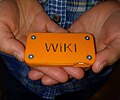Internet-in-a-Box
 The 2017 set-up of an offline medical library. Anyone physically near to the device may connect to it and download the offline content it contains. |
Internet-in-a-Box (IIAB) is a low cost digital library, consisting of a wireless access point with storage, which users nearby can connect to.[1] The hardware and software from which it is built has changed since 2012, as miniaturization of storage space and electronics progressed.[2] As of 2017, its hardware often consists of a Raspberry Pi with a replaceable storage card.[1]
In 2016, Columbia University's Masters in Public Administration in Development Practice (MPA-DP) explored using these boxes in the Dominican Republic for three months.[3]
Distribution of devices assembled by Wiki Project Med Foundation via the Wikipedia Store began in 2024.[4] It ships a Raspberry Pi Zero 2 W with a 256 GB SD card, which contains all of English[failed verification] and Spanish[failed verification] Wikipedia, among other resources.[4]
Digital library
The digital library is composed of multiple modules; modules may be pre-installed, or users may choose which to install. Examples of modules include Wikipedia in a specific language, Wikipedia's Medical Encyclopedia, Khan Academy Lite, and OpenStreetMap.[3][1] Other content includes Moodle, Nextcloud, MediaWiki, PhET (interactive mathematics and science simulations), TED Talks.[5]
History
The concept grew out of One Laptop per Child's school server project.[1]
- 2018 version with 3-D printed box
- 2017 version of IIAB with medical content
- Video overview of efforts in Dominican Republic
- Internet-in-a-Box 2019 version compared to passport
- Video discussing the rollout of IIAB in Peru in 2018
- IIAB in ESEAP Conference 2024
See also
References
- ^ a b c d Watkins, Don. "How to create an Internet-in-a-Box on a Raspberry Pi". Opensource.com. Retrieved 14 August 2017.
- ^ Gaskill, Braddock (2014). "Internet in a Box" (PDF).
- ^ a b "Internet-in-a-Box: Connectivity for the Rest of the World". 13 June 2017. Retrieved 14 August 2017.
- ^ a b Frauenfelder, Mark (1 August 2024). "Wikipedia's $58 gadget lets you access its entire library offline". Boing Boing. Retrieved 2 August 2024.
- ^ "How to create an Internet-in-a-Box on a Raspberry Pi". Opensource.com.




